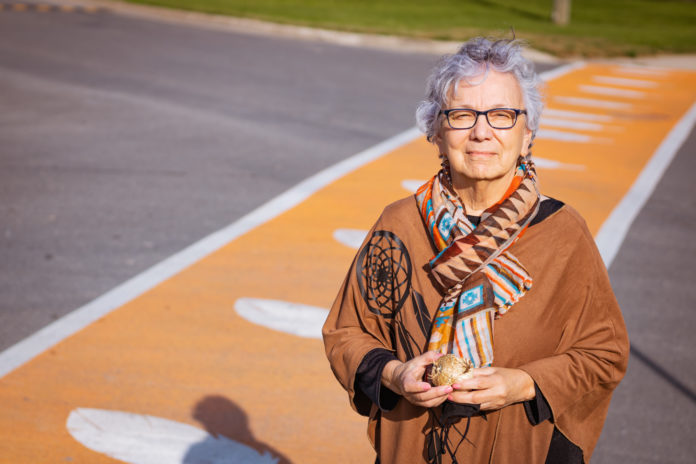

When Imelda Perley was elder-in-residence at the University of New Brunswick, she noticed students coming to class looking at their phones. She would tease them saying, “I hope you’re looking up our language on the Passamaquoddy-Maliseet dictionary site.”
But the joke got her thinking — there must be another way to engage non-Wolostoqey speakers.
“Our language is at such a dire strait that it needs every chance to be seen, to be heard, to be used, to be remembered, to be celebrated,” said Perley.
So in 2018, she designed the Wolostoqey Latuwewakon app.
The app is divided into categories such as “13 Moons,” “All my Relations” and “Clothing.” Clicking on a category will bring the user to further divisions and then to a specific word. The English word is shown first but when clicked, it switches to Wolostoqey. Perley’s voice reads the word out loud to show the proper pronunciation.
“I wanted [users] to think of this app as having an elder in your pocket,” said Perley. “Someone who can teach you to say the days of the week.”
This fall, she redesigned the original app to include written Wolostoqey along with spoken Wolostoqey. She wants people to not just hear the language, but to see the language too.
Students including Diego Bear helped Perley add written Wolostoqey to the app.
“I’m so excited for this young mind to be able to take our language and elevate its importance by showing it off and using [English and Wolostoqey] writing systems so that nobody has to choose between one or the other,” said Perley.
She said this app is exciting because users don’t have to pick just one language. She wants to tear down the wall between the two languages.
The app also gives information on identity and sacred items. One section of the app, “Language of Ceremony,” shows phrases to say when smudging. In her work with Health Canada, Perley uses her culture and language as a medicine bundle.
For a few days a week, Perley also works at Chief Harold Sappier Memorial Elementary School as their elder-in-residence.
She said it is a joy to have the responsibility of teaching language and culture to children.
Perley said it’s important to not only teach Indigenous children her language, but the world. She said the English language tends to objectify things.
“English says it’s just the river, it’s just the earth,” said Perley. “But for us, in our language, when we call our earth ‘mater’ and our rivers ‘great-grandmother,’ there is a responsibility and a love that we take care of those things in a relational way.”
Perley said this relationship highlighted by her language is one of the reasons she wants it to survive. She said it is not the language that is dying, but the people who want to speak it that are dying.
“Especially with all the unmarked graves, all of that coming up, it’s almost as if they’re saying, ‘okay, now’s the time, to bring that language out, bring that language back,'” said Perley. “So that’s my purpose.”
Perley is now working on an app where users can listen to an elder telling a story. Instead of translating a traditional English story into Wolostoqey, she is telling a story originally told in her language.
“We have our own stories about wolf,” said Perley. “We have our own stories of bear and beaver and famine.”
